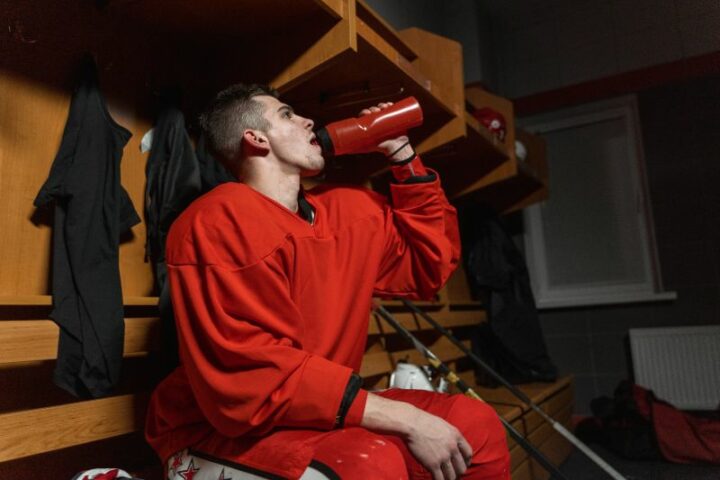During fast-paced and intense games or practices, monitoring hydration levels can often take a backseat for both hockey players and their coaches. Unfortunately, this often-overlooked detail has a direct impact on an athlete’s performance. It also has the potential to significantly influence the pace and outcome of a game.

The Consequences of Dehydration
Just as a car engine will overheat and fail without enough coolant, a hockey player will overheat and lose their ability to perform on the ice without proper hydration. Dehydration is a slippery slope. It can quickly escalate from decreased aerobic performance and endurance to cramping, heat exhaustion, and fatigue. This is especially risky during high-intensity workouts or games when your mind is preoccupied and laser-focused on so many other things. Even the very early stages of dehydration decrease your performance unless you take action and correct it immediately. To avoid this altogether, it’s crucial to remain hydrated well before you set foot into the locker room.
How to Stay Hydrated: Tips for Hockey Players
Implementing proper hydration habits is crucial for hockey players to maintain optimal performance and avoid the negative effects of dehydration. In this section, we’ll explore key strategies to help you recognize early signs of dehydration, determine your individual hydration needs, and establish effective fluid intake routines for exercise and recovery.
1) Recognizing Thirst as a Sign of Dehydration
To avoid the common pitfalls that accompany dehydration, it’s important to educate yourself and your team about the importance of hydration. Hockey players should drink plenty of water and electrolyte beverages throughout the day even before feeling thirsty. In fact, thirst is an indicator that you are already mildly dehydrated.
2) Determining Your Individual Hydration Needs
Figuring out how much water to drink in a day depends on your anticipated activity level. It also depends on how much you tend to sweat during strenuous exercise. If you’re unsure how much fluid you typically lose, you may want to consider a pre-and post-workout weigh-in. This will help you determine how much water weight you’re losing so you can replenish your fluids accordingly. This is especially important for heavy sweaters who may require a higher liquid intake than their teammates.
3) Guidelines for Fluid Intake During Exercise
As a general guideline, the water weight you lose during exercise should be replenished with 1.5 times that amount of fluids. For example, if you lost one pound of water weight during a workout, you would need to consume 24 ounces of liquid to adequately replenish your fluid levels.
Choosing the Right Hydration Beverage for Hockey Players
To avoid dehydration and maximize performance, hockey players should be drinking between 6 and 12 ounces of liquid every 20 minutes during a game or training session. Although water is good, it’s best to consume beverages that contain carbohydrates and electrolytes such as sodium and potassium to make up for what is lost through sweat. This will help replenish your fluids more quickly and effectively while delaying fatigue and supplying your body with a readily available source of energy with carbohydrates.
Making Hydration for Hockey Players a Priority for Peak Performance
To make hydration simple and set yourself up for success, calculate how much fluid you typically lose during a workout or game, and hydrate accordingly before, during, and after physical activities. This will help you maximize your performance out on the ice, prevent the side effects of dehydration, and avoid getting sluggish or fatigued during games that demand high levels of focus and energy. Taking just a few extra minutes each day to properly hydrate will make all the difference, and always keep you performing at your highest potential.
Please share these tips to ensure proper hydration for hockey players with your friends and family.



